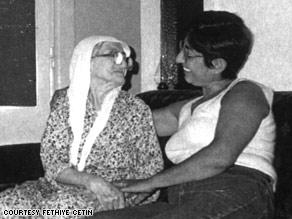Today, 24 April, marks the 102nd commemoration of the beginning of the Armenian Genocide of 1915-1916. Often, debates on the Armenian Genocide center around demographic data of lost Armenian lives in the genocide and overlook the fact how each killing affected a family irreversibly. Mass atrocities and deportations weighed on families, disrupting relationships between relatives, husbands and wives, as well as parents and children. Survivors of the genocide lost contact with their family members and were scattered into various regions, from the Middle East, Russia and Europe to the American and Australian continents. This blog focuses on separated survivors of the Armenian Genocide and how sometimes their descendant families are reunited.
Guest blog by Ayşenur Korkmaz, PhD Student University of Amsterdam
Most Armenian survivors fled the Ottoman Empire in seek of refuge, a few managed to endure in the newly minted Turkish Republic. The survivors who managed to flee the Ottoman Empire carried their Armenian heritage and memories with them. They preserved the Armenian language and cultural traditions in their new countries. Migration gave them a new range of experience with community building and identity (re)formation in the diaspora. Some relatives of these survivors managed to remain alive in Turkey. They were either lucky enough to preserve their religion and language, living in major cities like Istanbul; or they survived at the cost of converting to Islam, and becoming Turkified or Kurdified. Several descendants of these survivors wrote memoirs about their family experiences in post-genocide Turkey.
Family Memoirs
A very touching account is Serdar Can’s memoir which was published in 2015, named Nenemin Masalları (The Tales of My Grandmother). In the book, Can writes about the story of his grandmother Xelat who became the third wife of a Kurdish villager at a very early age in 1915’s Diyarbakır. Can decided to write his grandmother’s story in Diyarbakır Prison where he stayed for ten years as a political prisoner between 1981 and 1991. In the reign of severe tortures against Kurdish political prisoners, Can must have wanted to connect the memories of his grandmother to his ordeal in contemporary Turkey.
In the aftermath of a series of traumatic experiences, some survivor families found ways to contact or reunite with their relatives in Turkey. These unions mostly became possible through the efforts of later generations. A famous writer from Turkey, Fethiye Çetin, writes about the story of her grandmother’s survival in Turkey and the family’s reunion with relatives from the US. The book Anneannem (My Grandmother) narrates how Çetin’s grandmother Heranush lost her family and was adopted by an Ottoman soldier in her early childhood. Her parents ended up migrating to the United States of America and her brother Horen remained in Syria. Heranush's parents contacted both Horen and her to bring them to the US. Heranush decided to remain in Turkey, became Muslim, and she had never been able to reunite her family members who reside in the US. Her granddaughter, Fethiye Çetin, contacted them to bring the family together.
Reuniting Families
There are many stories that resemble Fethiye Çetin’s family story. I consider myself a fortunate researcher who could witness some of these family reunions. In 2014, I met an Islamized Armenian family in Batman, a south-eastern city in Turkey mostly populated by Kurds. This family had survived the Armenian Genocide of 1915-1916. One branch of the family negotiated with a Kurdish tribe to stay alive and live in their village at the cost of converting to Islam. After the genocide, they moved to Istanbul and Diyarbakır, changed their names, and hid any evidence that would compromise their Christian Armenian past. They developed a survival strategy, allowing only endogamy or marriage with descendants of other Islamized Armenians.
The other branch of the family also survived the genocide and found refuge in France and Tsarist Russia. They actively traced the trajectories of their distant relatives in Turkey, sending them a letter in which they requested a meeting. Fearing of societal pressures, the Islamized survivors decided not to respond to the letter until 2013, when a fourth-generation survivor, decided to meet their relatives, learn Armenian, and move to Yerevan. Through his efforts, a unique reunion has been arranged in Yerevan where all parts of the family gathered.
A Different Focus on the Armenian Genocide
These family stories make the Armenian Genocide real and frameable. Memories of survivors, transmitted through generations are powerful to show what kind of damage was done during the genocide. Much more than legal discussions on the Armenian Genocide, we need more focus on family stories to overcome the denialist narratives of the Turkish state.
